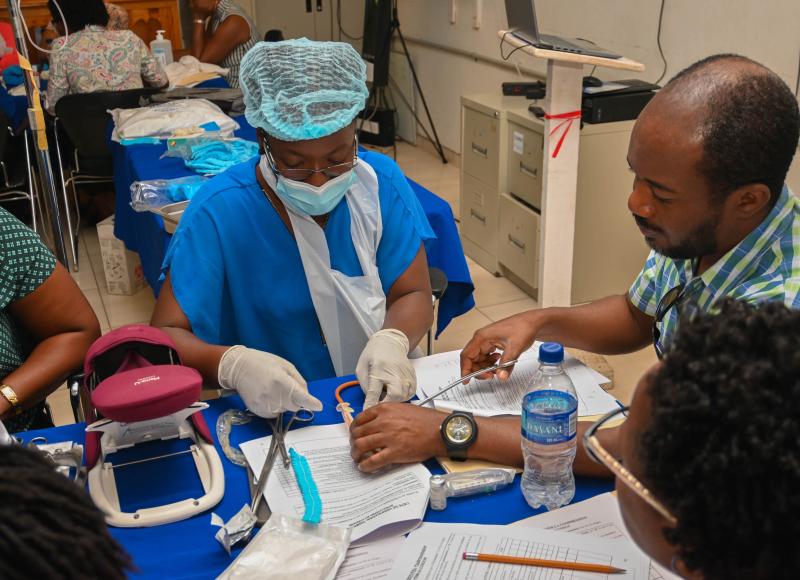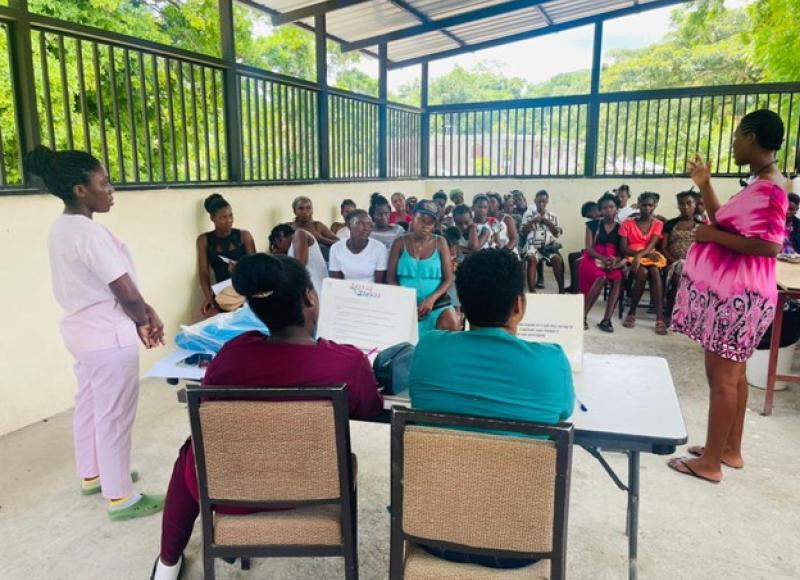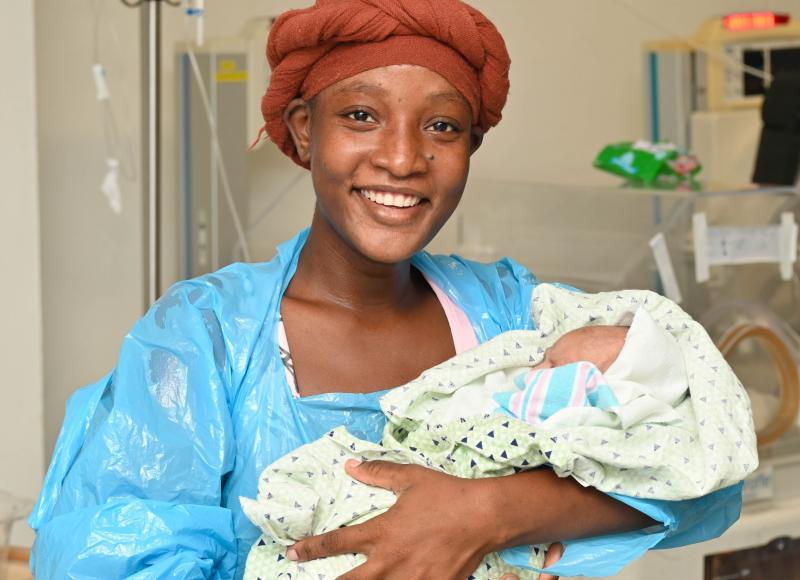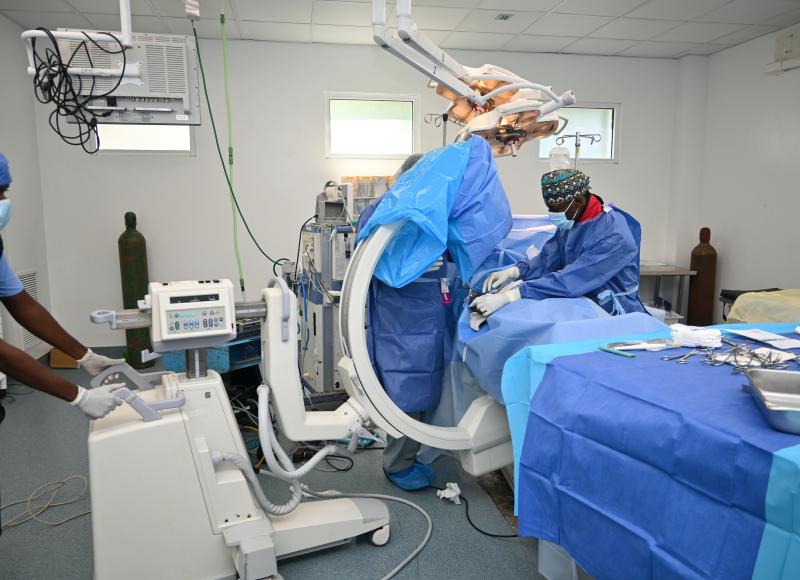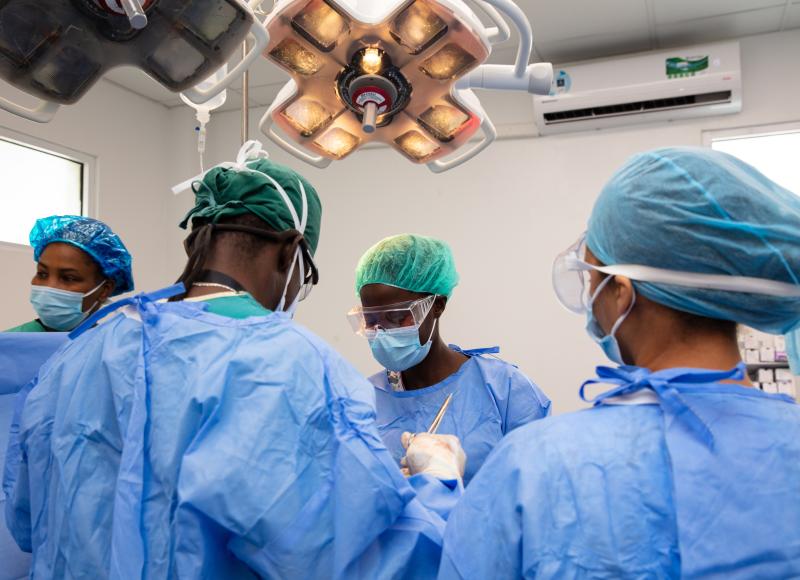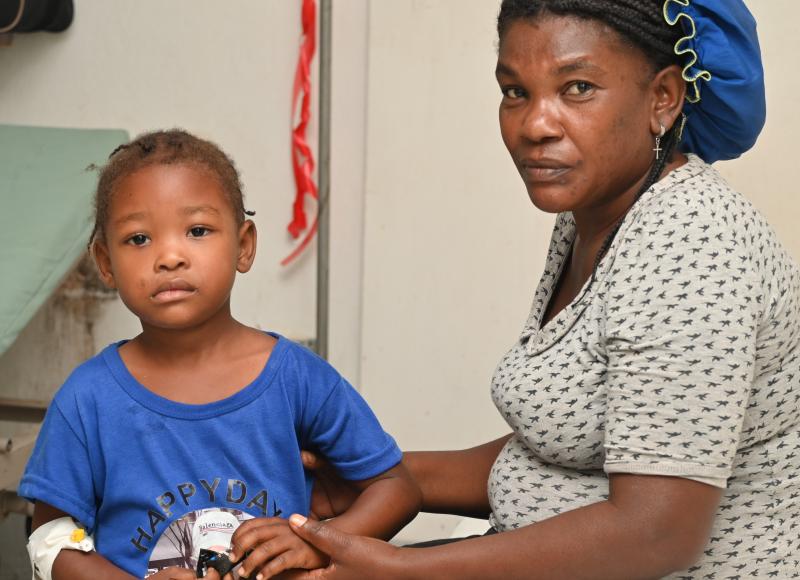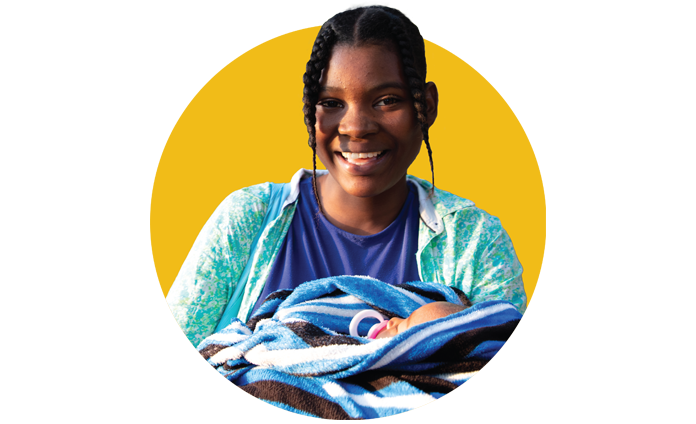
Annual Report 2023
From the President & Chair of the Board
Dear Friends,
St. Boniface Hospital (SBH) was open and fully operational, 24 hours per day, every day of 2023.
This fact should not be noteworthy. But it was nothing short of remarkable during a year of devastating humanitarian crisis in Haiti—one that forced many other hospitals to shutter.
We, too, faced incredible challenges in 2023, which persist as we write this letter. Unrest has made it incredibly difficult to procure fuel, medicines, and essential supplies. The security risks and the damage to other health systems resulted in more people turning to SBH for care. Yet travel is so risky that patients delay seeking medical attention until they are in an emergency. Food and clean water are harder to find. Years of instability and gang violence have taken a psychological toll on everyone.
But we did not just keep SBH running in the face of these obstacles. We saw thousands of patient visits across all departments. We created innovative new programs. We installed new, state-of-the-art equipment. We trained dozens of residents to provide skillful, equitable care. We improved service provision at health facilities across the region. We did more than we could list in a single report.
Why did we push ourselves to keep raising the bar during a time of strife? Because too often, people living in countries like Haiti are given the message that they should be happy with whatever they can get, even if it’s substandard or doesn’t meet their needs. That something is better than nothing.
We reject this notion entirely. All people, no matter their circumstances, deserve quality resources and services. That is what it means to treat people with dignity and respect. And that is why we keep going when the going gets tough.
We are proud of what we accomplished in 2023 not because it was done in the face of adversity but because our patients deserve nothing but our best, regardless of what else is happening in Haiti or the world.
Your generosity made everything in this report possible. We are so grateful to have you as a true partner in this important work, and your unwavering dedication means so much.
On behalf of all our staff and patients, thank you.
Sincerely,
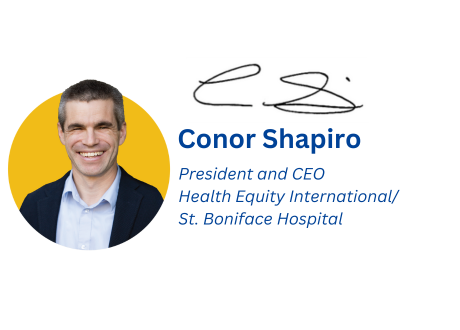
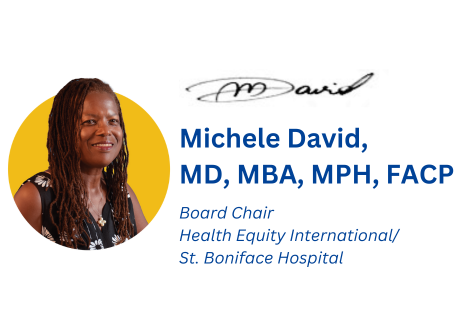
What We Do
Health Equity International (HEI) has been providing essential health and support services to those in need for more than 40 years.
SBH, our healthcare facility, is the largest healthcare provider for over 2 million people in southern Haiti and serves as a model health system for the entire country. Our doors are always open, and no one is ever turned away because they cannot pay.
SBH’s dozens of clinical programs are designed to meet and evolve with our patients’ needs. Here, medical professionals at every level of their careers come to learn and expand their skills. And through SBH’s community health program and satellite clinic, we are ensuring people living in even the most remote places can access the care they need.
At HEI, we believe in delivering quality, dignified, compassionate services that help everyone reach their full potential. Together, we’re building a healthier world.
2023 By the Numbers
Patient visits increased in nearly every hospital service in 2023, driven largely by the impacts of Haiti’s humanitarian crisis. Despite immense obstacles, our staff stopped at nothing to be there for every patient in need.
154,422
Outpatient visits
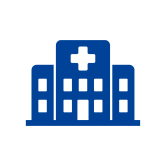
11,399
Inpatient admissions

4,239
Births
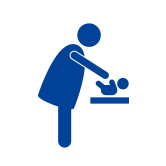
1,292
NICU admissions
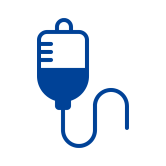
4,708
Surgical procedures

1,841
C-sections

9,259
ER visits

74
Young medical professionals trained
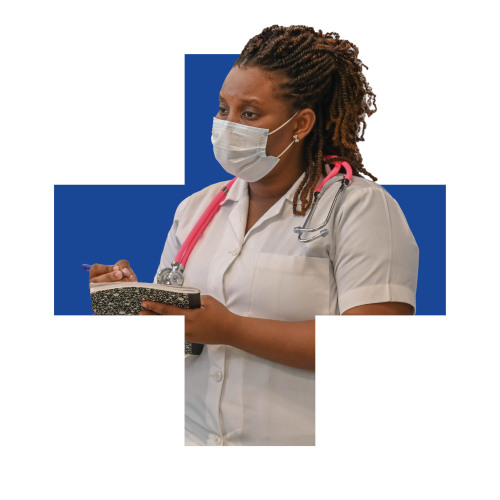
Capacity Building and Sustainability
Providing world-class, accessible care requires more than just treating patients.
That is why HEI has developed some of Haiti’s most robust programs in clinical training, biomedical equipment repair, health system strengthening, and more. These programs enable us to continuously improve the level of care provided in the region and ensure the services we create are built to last.
Through our capacity-building and sustainability programs, we are creating opportunities for our wider community and making a brighter future for southern Haiti and beyond.
Kore Sante
We are proud to be leading a five-year project funded by the U.S. Agency for International Development (USAID) to increase access to high-quality health care in southern Haiti: the Improved Health Service Delivery (IHSD) Project / Partnership for Equity in Health Activity. With this project, we are helping to reach more people in more places than ever before.
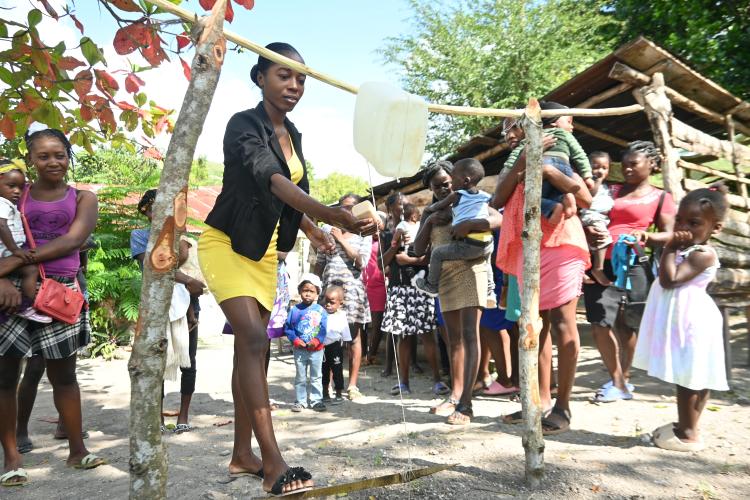
A community member uses a Tippy Tap device to wash her hands
Known as Kore Sante (“Supporting Health”) locally, the project provides training, technical support, and financial assistance to health system actors in Haiti’s Grande Anse, Nippes, Sud, and Sud-Est geographic departments. We are implementing Kore Sante together with seven local nonprofit organizations and 31 public and private healthcare facilities, all under the guidance of the Haitian Ministry of Health and Population. Throughout the complexities of the past two years, we are proud of the active partnerships we have built to bring health services to vulnerable communities.
Key Impacts in 2023
-
Swift response to cholera outbreaks in remote areas: 155 households decontaminated, 1,000+ hygiene kits distributed and 11,000+ people educated on disease prevention
-
48,107 children reached by nutrition programs, including 1,180 treated for moderate acute malnutrition and 825 treated for severe acute malnutrition
-
11,979 women seen for at least one prenatal visit
-
10,473 newborns visited within 3 days of birth
-
2,500 people living with HIV receiving treatment, 87% with suppressed viral loads
-
40,950 women using a modern contraception method
Selected Training Activities
-
294 community health workers trained and supported
-
896 traditional birth attendants educated
-
469 traditional healers and religious leaders participated in meetings and training sessions on public health topics
-
22 pregnancy clubs established, enrolling 617 women and increasing prenatal visits
-
10 youth clubs established, mobilizing 259 young people under age 25
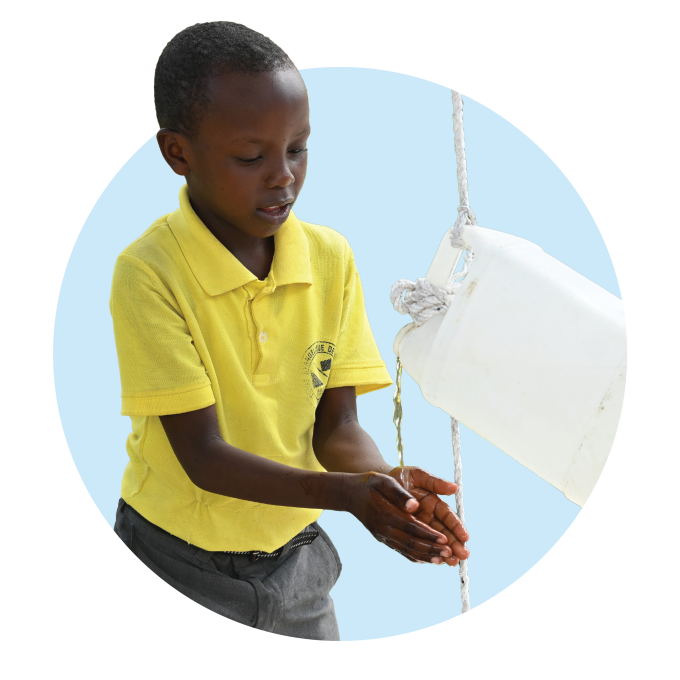
Making Handwashing Easy and Fun
The Kore Sante team worked together with community leaders to install simple and effective handwashing devices that are helping to prevent the spread of waterborne dieases.
Training the Next Generation
SBH’s residency and scholarship programs help hone Haiti’s best medical professionals.
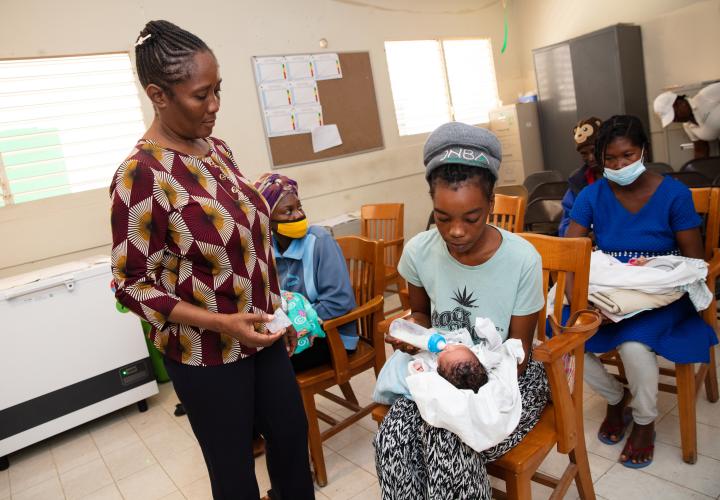
Dr. Clermont works with mothers and their infants in SBH’s community health room.
Dr. Miliane Clermont became SBH’s Director General in 2023. However, few people know that she got her start as our first-ever nursing resident back in 1994. Recognizing her immense talent, SBH gave her a scholarship to fulfill her dream of becoming a doctor. She has been key to the growth and development of our work ever since.
Dr. Clermont isn’t the only person whose career was transformed through residency and scholarship opportunities at SBH. Each year, we nurture dozens of young clinicians who are eager to learn and shape the future of healthcare in Haiti:

Social Service Residents
38 hosted in 2023
Newly graduated medical students who are completing a mandatory year of work at a Ministry of Health-affiliated hospital.

Specialty Residents
36 hosted in 2023
Established clinicians who want to become an expert in a particular area of medicine.

Scholarship Students
33 funded in 2023
Eager students from Fond des Blancs who wish to attend nursing school.

[SBH] is hugely important because it allows me to progress as a young professional, and also you increase your capacity to provide care with compassion.
Luroinyo Joseph, Social Service Resident
Biomed
The REPARE (Reparation Pou Amelyore Ekipman Medikal) program began in 2016, with funding from USAID, to help solve the chronic problem of broken medical equipment and lack of repair technicians in Haiti. Today, it is continuing to save lives at SBH and other healthcare facilities across Haiti.
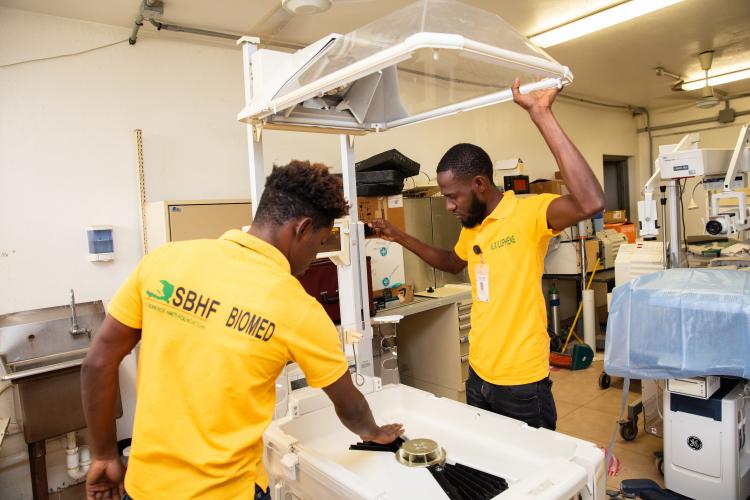
Alix Ilophene (right) and his team fix a neonatal incubator in the REPARE workshop.
The REPARE program began as a way to train Haitian professionals to become biomedical equipment technicians (BMETs). Today, the program helps support BMETs at SBH and in select hospitals in Haiti through technical assistance and ongoing learning opportunities.
SBH’s REPARE workshop is always buzzing with activity. At any given time Alix Ilophene, our chief biomedical engineering officer, might be fixing an incubator for our neonatal intensive care unit (NICU). Or he could be listening to sounds coming from the motor of an oxygen concentrator, trying to diagnose a problem. And that’s on top of frequent rounds to examine every piece of equipment in every department, and routine staff reviews on proper equipment usage.
“What makes me particularly proud of my job is the fact that I participate actively in the high-quality care that St. Boniface is offering for free to the community,” says Alix.
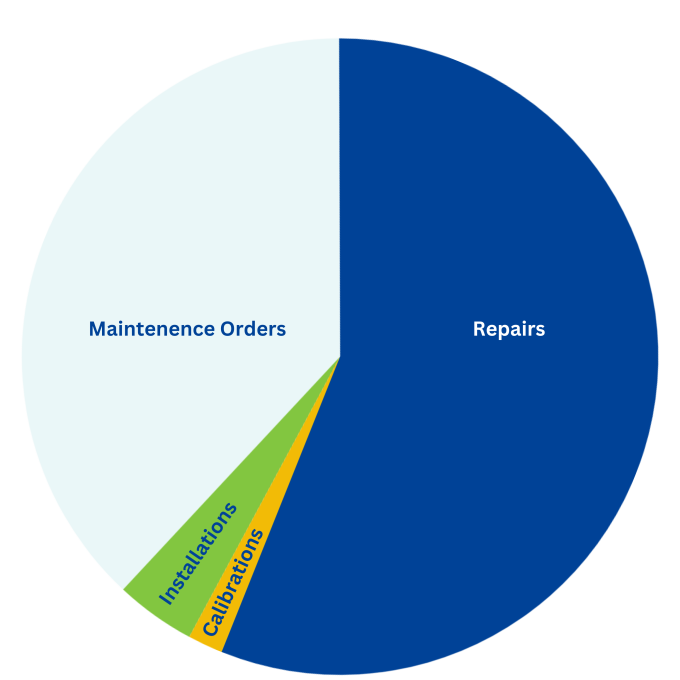
REPARE’s Work in 2023
220 Repairs Equipment repairs restore broken equipment to good working order.
149 Maintenance Orders Cleaning and other routine maintenance help increase the longevity of biomedical equipment and prevent breakdowns.
16 Installations Correctly installing new equipment takes time and expertise.
7 Calibrations Equipment calibration helps ensure accurate measurements and proper recording of data.

Patient Care
Our dedicated clinicians saw 154,422 patient visits in 2023, an average of over 400 visits per day. We saw the need for urgent care surge across the hospital, driven by the impacts of the ongoing crisis. We were honored to be there for so many patients when they needed us most.
In addition to the core services highlighted in the following sections, patients regained independence through our spinal cord injury rehabilitation program, made informed decisions about their reproductive health at our family planning clinic, found support through our comprehensive HIV/AIDS program, and so much more.
Every day, SBH is proving that high-quality, affordable, and sustainable care is possible in Haiti.

“For me [the hospital] is hugely important. My mother, my father, and I are from Fond des Blancs, and when we have a problem we come to [SBH].” - Joseline, patient
Maternal and Child Health
SBH’s maternal and child health program is saving lives every day.
Twenty-one years ago, Joseline was born right here at SBH. When it came time to deliver her own child, there was nowhere Joseline trusted more.
In 2023, Joseline was one of 4,103 women who gave birth at SBH. But unlike Joseline, most of these women—a staggering 89%—came from outside our immediate community. Many traveled for hours to reach our doors because they needed a safe place to deliver. And many arrived in need of urgent care.
We have seen an unprecedented increase in the demand for our maternal, neonatal, and child health (MNCH) services as Haiti’s ongoing crises continue to disproportionately impact women and children. Our MNCH teams worked tirelessly to mitigate these effects by delivering impactful programs that meet our patients’ real needs.
Here are just three of the many ways we kept women and children healthy during these difficult times:
More Patients, More Care
From 2022-2023, we saw a dramatic increase in demand for essential MNCH services:
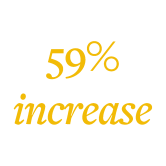
women with high-risk pregnancies

life-saving C-sections
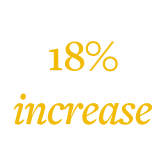
NICU admissions

pediatric inpatient admissions
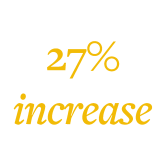
pediatric outpatient visits
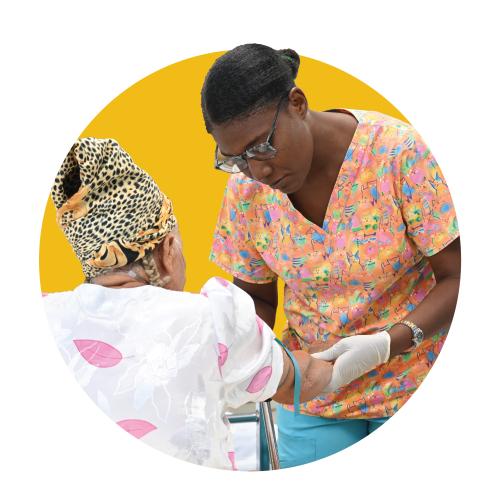
Miss Geneviève Edumé, Head Emergency Room Nurse
Infectious Disease and Emergency Care
SBH’s Center for Infectious Disease and Emergency Care (CIDEC) is a one-of-a-kind facility that helps treat patients in urgent need.
“Health equity means providing the same quality of care for all people whether you are poor or rich,” says head emergency room (ER) nurse Geneviève Edumé. “It’s a belief that all people who come looking for care will find it available.”
The CIDEC sees some of SBH’s most critically ill patients. Ensuring these departments remained open and fully operational throughout a year of unrest was one of our highest priorities.
In 2023, Nurse Edumé and her team saw 9,259 visits to the ER, and safely transferred some of these patients to the Infectious Disease Center (IDC) where they were treated for highly contagious conditions such as tuberculosis. Patients may come to the ER with severe symptoms, such as difficulty breathing or extreme dehydration. Some patients go on to be admitted to the IDC for safe, isolated inpatient care. Others remain in the ER for the duration of their stay, or are transferred to our surgical, pediatric, or internal medicine departments for more specialized care. In total, the IDC saw 157 inpatient admissions, with an additional 202 admissions to our adjoining cholera treatment center.
Regardless of where a patient receives care during their stay at SBH, the CIDEC is an essential hub that helps save lives every day.
Containing Cholera
Cholera reemerged in Haiti in late 2022 and quickly spread throughout the country. While our community health team worked to mitigate its impact in our area, our ER and infectious disease teams worked to diagnose and safely treat all suspected and confirmed cases at SBH. In total, we admitted 202 patients with symptoms of cholera for safe, isolated care. Fifty-five of them were children, like little Jean*.
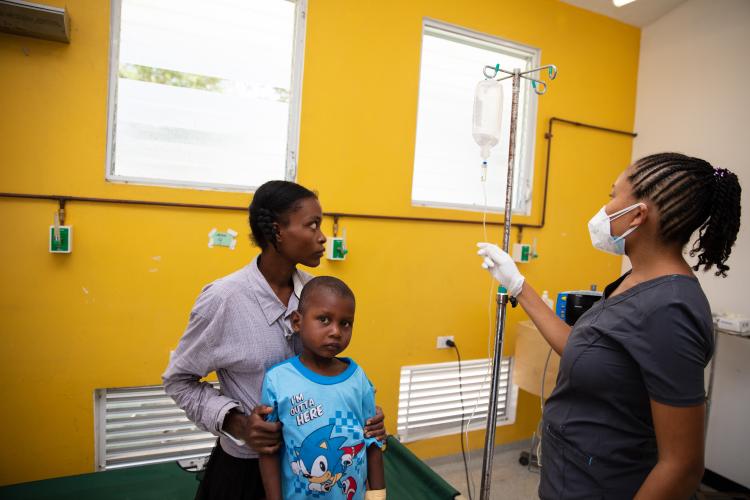
Jean is treated for cholera in one of our isolation rooms.
Cholera can be particularly dangerous for children as their smaller systems can reach extreme dehydration and go into shock more rapidly than adults. Fortunately, Jean’s mother acted quickly. Once at SBH, nurse Katia helped keep Jean hydrated while he safely healed in one of our comfortable isolation rooms. Soon, Jean was ready to go home healthy once more.
*Name changed to protect patient’s privacy.
Making Long-Term Treatment Easier
SBH had 177 patients enrolled in our tuberculosis treatment program and more than 1,300 patients in our HIV program in 2023. During periods of unrest, our infectious disease and community health teams must go the extra mile to help these patients stay well.
Treating tuberculosis and HIV/AIDS requires strict adherence to medication regimens and regular checkups. But in Haiti, travel can be expensive and if a patient lives far from the hospital, they may need to take a day off work—and lose a day of wages. During times of crisis, when travel is risky and money is hard to come by, these barriers can be insurmountable.
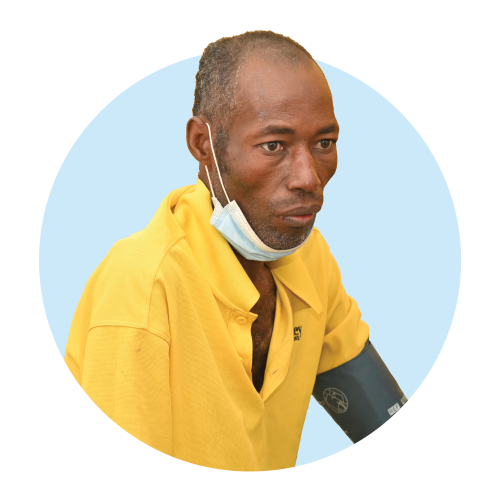
Jojo receives treatment for tuberculosis in our infectious disease center.
Throughout the year, our IDC and community health teams worked together to overcome these obstacles. For some patients, we provided larger medication refills during hospital-based appointments so they wouldn’t have to return as frequently. For others, our community health workers made home visits to conduct checkups and deliver medication refills. If a home-based patient needed more extensive follow-up care, we covered the cost of transportation to the hospital. Thanks in part to these efforts, the number of patients adhering to treatment remained relatively steady throughout the year.
Surgery
At SBH, access to surgery is a guarantee. Here, our skilled team provides a vast slate of general, pediatric, and orthopedic procedures all day, every day—for everyone in need.
“Surgical care is truly difficult to access in Haiti,” says Chief of Surgery Dr. Pierre Abdias Jules. “There is so much demand, and each day the demand is greater. It is our responsibility to provide care to those people who are seeking health care, whether they are just routine cases or urgent cases.”
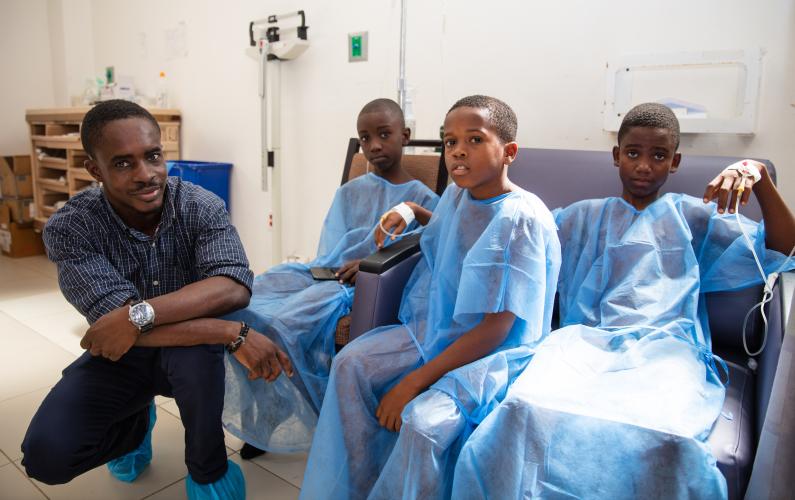
Dr. Jules, left, with three of his patients.
In total, our surgeons conducted 4,708 procedures in 2023, 60% of which were emergencies. The total number of emergency procedures increased by 10% compared to 2022. As with other increases in urgent care we’ve seen across the hospital, we believe these increases are driven in part by the impacts of Haiti’s crises.
“In the surgery department, we strive every day to improve what we offer in terms of high-quality health care,” Dr. Jules continues. Even though he and his team were busier than ever, they still worked hard to raise the already high bar they’ve set for their program:
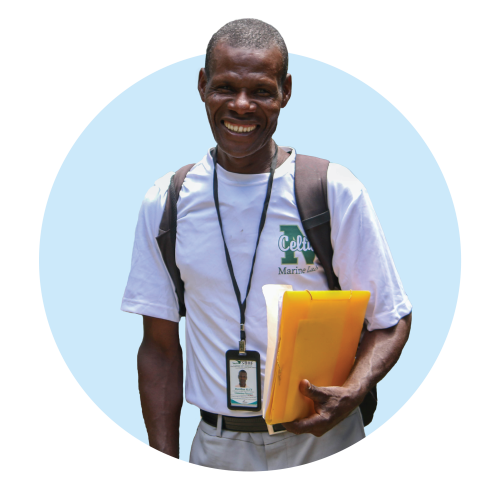
“We always work wholeheartedly, whatever kind of work we are doing.” - Alcy Dorvilus, Community Health Team
Community Health
Alcy Dorvilus has been a member of our community health team for 24 years.
Today, he may be providing primary care, vaccines, and malnutrition screenings for dozens of children at a rally post. Tomorrow, he may be visiting pregnant women at their homes to ensure they are well. And the day after that, he may be helping a patient get to SBH for more extensive treatment.
Alcy and his fellow community health workers were busier than ever in 2023. In total, they ran 553 rally posts where they administered 13,080 doses of essential childhood vaccinations and conducted 14,510 pediatric malnutrition screenings. They conducted 3,649 group health education sessions, ranging from nutrition basics to how to prevent the spread of cholera to understanding HIV/AIDS. And they provided an incredible 9,080 home visits for pregnant women and community members who were ill or injured.
But Alcy and his teammates don’t mind being busy. They are a critical link between community members and the larger health system. “I am the eyes of the hospital,” says Alcy, “When you save someone’s life, that’s worth more than any amount of money you could give [them].”
Haiti’s humanitarian crisis has had a dramatic impact on the health of all Haitians. As food has become ever more scarce and expensive, we saw a need to address pediatric malnutrition in the communities we serve. Together with support from our donors, our community health team continued advancing two innovative nutrition programs that empower women and help protect children and families from devastating hunger:
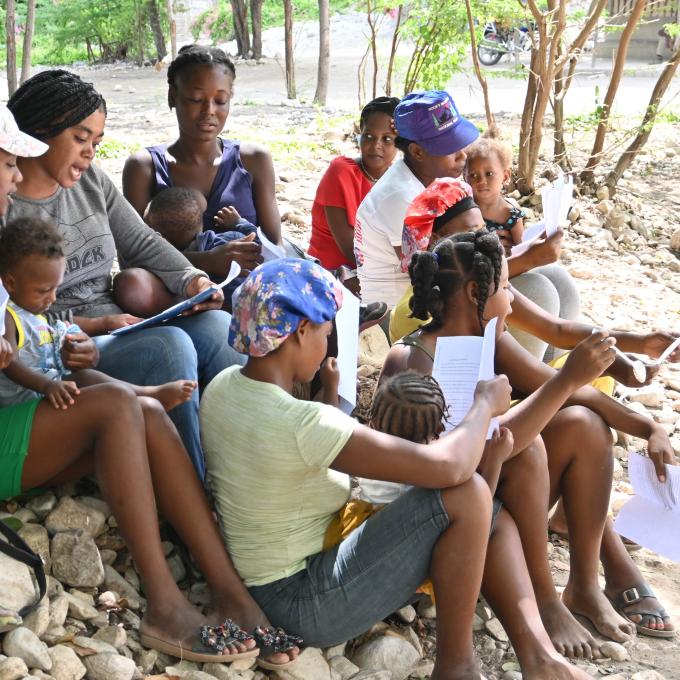
Ti Fwaye Nutrition Program
We held 12 Ti Fwaye sessions for 240 mothers and 157 children in 2023. Every one of them is important.
When a young girl and her family missed a day of the program, community health worker Ginette Elipha was determined to find out why.
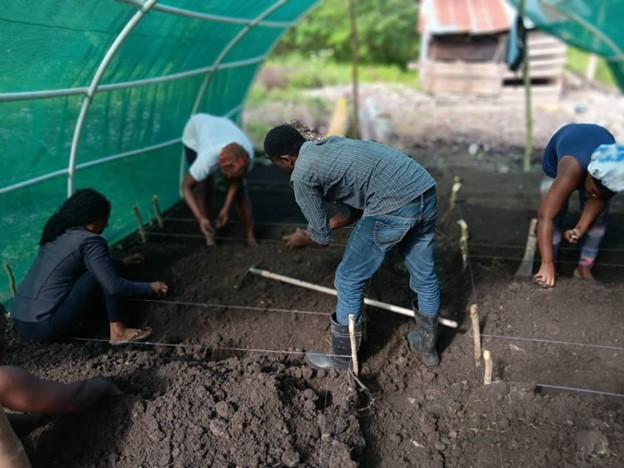
Jaden Mwen Gardening Program
Jaden Mwen, or “my garden”, teaches mothers of malnourished children to grow produce at home. In addition to providing nutritious food for their children and families to eat, the program also empowers women to sell excess produce at their local market to generate income.
Local agronomists lead each session and provide training on soil preparation, planting, and proper irrigation. In 2023, these agronomists worked with 25 mothers in three communities to begin cultivating nurseries and home gardens. They also conducted follow-up visits with eight families who began cultivating gardens in 2022, providing technical assistance and coaching. All of the established gardens have been able to produce nutritious food to feed participating families. In addition, several families have been able to successfully grow excess produce to sell at their local market.
Although Haiti’s crises have led to a more limited rollout of this project, we are proud of its early successes and are excited to continue watching it expand.
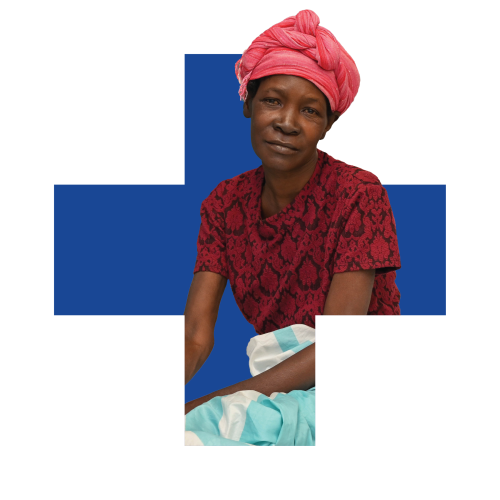
Donor Roll
Generous donors like you helped SBH overcome enormous obstacles and provide 24/7 care to every patient in need throughout 2023. Your dedication saved lives.
This list of donors represents individuals and organizations that made contributions during our Fiscal Year 2023 (July 1, 2022- June 30, 2023). Gifts given after the end of our fiscal year will be recognized in our next annual report.
On behalf of all of our staff and patients, thank you.

Financials
HEI/SBH ended Fiscal Year 2023 (July 1, 2022-June 30, 2023) in a strong financial position.
Generous funding from our partners and supporters helped us deliver dignified services while strengthening the Haitian health system during another challenging year in Haiti. Together we continued to combat cholera, navigated countrywide supply shortages, built robust new hospital- and community-based programs, and more.
We are deeply grateful to all who made this work possible.
